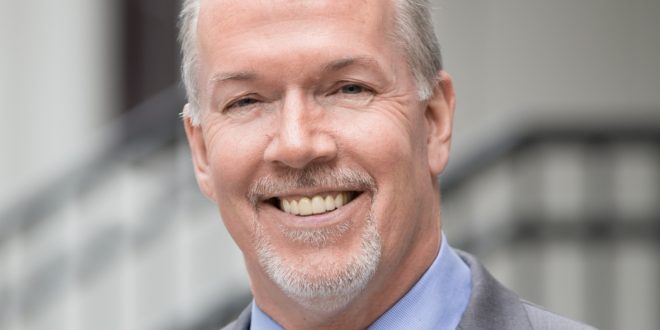Life has never been a cake walk for the Premier of British Columbia John Horgan. Be it paying for his education, surviving a life-threatening disease like cancer or becoming the premier under most dramatic circumstances, Horgan has worked extremely hard but finally come through with flying colours in these difficult situations.
Born in 1959, the youngest of four children Horgan was just 18 months old when his father passed away. His mother was left alone without her family support system. His mom had a full-time unionized job, but it was still hard to make ends meet with four kids. Despite his family’s limited finances, Horgan was determined to attend university. He worked several jobs to save up the funds to go: delivering newspapers, waiting tables and driving delivery trucks. He worked in government and in business for many years.
In May 2005, he ran for and won the race to become MLA for the riding of Malahat-Juan de Fuca. In 2008, he was diagnosed with bladder cancer. But he fought the disease to regain health again. In 2014, Horgan became leader of the BC New Democrats. And in 2017, he was sworn in as the Premier of BC. The 2017 elections were most dramatic in the history of the province. It was the first time in 16 years that the NDP came to power with razor thin minority government. The NDP had 41 MLAs and were being propped up by the Green’s three MLAs, who together outvoted the Liberals by a 44-43 margin. Many eyebrows were raised since the minority government phenomenon has not been very successful in the Canadian history. But so far not only Horgan-led government has witnessed smooth operations and it is looking forward to serve the people of British Columbia for the full-term and beyond.
In an interview with Desi Today, Horgan talk about his journey so far and the challenges ahead.
It has been six months since you took over as the Premier of BC, how has been the journey?
It’s been an amazing journey. From the moment the Lieutenant Governor asked me to become Premier, I couldn’t wait to get to work to make life better for people. In the past six months we’ve accomplished a lot – raising income assistance rates, removing unfair tolls on the Port Mann and Golden Ears bridges, protecting renters, building new affordable housing, funding classrooms so our kids can get the education they deserve, reducing MSP, cutting taxes for small businesses, creating jobs for people in the tech sector, getting big money out of politics for good, and so much more.
But there’s still more to do, and I can’t wait to get started this new year.
2) 2017 was a dramatic year in the history of BC politics. Everyone especially had apprehensions about running a coalition government, how has been your experience so far dealing and working on day to day basis with a different party members? How do you plan to deal with the differences that might emerge over the period?
People in British Columbia voted for a change in government in 2017. They wanted a government that more accurately reflected themselves, what they believed, and what their issues were. Our agreement with the Green Party helped us achieve that. The Confidence and Supply Agreement gives voters the stable and secure government they want and allows us to work on the commitments we made in the campaign – making life more affordable, improving the services we depend on, and making sure we have a strong economy that works for everyone. We know we’re not always going to agree on everything with the Green Party. But we have an open dialogue that includes consultation so we can work on the issues that matter to people.
What was the British Columbia you inherited from the previous government and what is your vision for the province?
The previous government made life harder for regular British Columbians while their wealthy friends and donors cashed in. They stood back and did nothing as life got more and more unaffordable and they cut services and starved our kids’ classrooms for resources. They made bad choices at ICBC and BC Hydro that pushed costs up for people.
I believe people want a government that works for them. My vision for BC is a place where people can get the services they count on, when and where they need them. It’s a place where people aren’t choosing between rent and food, and where families can find housing they can afford. It’s a place with good-paying, stable jobs. Our province should have an economy that works for everyone.
The challenges facing British Columbians didn’t arrive overnight, and it will take time to fix these problems. But I get up every day and work hard to take real steps to make a better province a reality.
What are some of the major policy changes that BC people might expect to see this year?
I think people want to see action that makes their lives more affordable – specifically on housing and childcare. These are issues we are going to be focussing on in the coming months.
So many changes in the rules and regulations to cool down hot housing market in B.C. Could you please sum up for our readers, the steps your government has already taken and it plans to take in the near future to address the issue of housing affordability?
We have taken a number of first steps to start tackling the housing crisis. We’ve closed fixed-term lease loopholes so renters are no longer vulnerable to significant and unfair rent increases. We’ve invested in homes for people, including 1,700 new affordable housing units and 2,000 modular homes for the homeless. We’re working on getting more supply into the market place, and studying demand-side measures to address the crisis in housing affordability.
There is so much more to do to make up for years of the previous government’s neglect of housing costs. As I said, we didn’t arrive at this crisis overnight and it will take time to fix it. But we’re going to work hard, every day in government to get it done. We’ll be introducing more see some solutions for the housing crisis in February’s budget.
The government’s decision to continue building Site C dam on Peace River was quite contradictory to the set of values NDP stands for? What ideology or the value went behind the decision? How are you dealing with the reaction?
Our decision-making process on Site C is a good example of what people can expect from our government. We listened, we deliberated and we debated and, at the end of the day, we came to the conclusion that although Site C is not the project we would have favoured and it’s not the project we would have started, it must be completed to meet the objectives our government has set through mandate letters to ministers and commitments to the people of B.C. during the election campaign. We will always do our due diligence and investigate the issues in front of us. We will make decisions – sometimes very hard ones – in the best interests of British Columbians. We sent Site C to the BC Utilities Commission to we made the right decision for families, to keep Hydro rates affordable. Ultimately, with the project already 25 per cent finished, we decided we could not ask British Columbians to take on $4 billion dollars in debt with nothing in return. I would not put at risk our ability to deliver services like education, health care and child care – services people count on.
Middle-class families are still left in a limbo about your important campaign promise of 10 dollars a day, child care program? There was no clear mention as to how and when the government wanted to implement it. Could you tell us when does the government plan to implement it?
We’ve been working every day to deliver on our child care commitments. Minister of State Katrina Chen has been reaching out and consulting with a broad range of early learning and childcare advocates and practitioners. Making childcare affordable and accessible for more British Columbians than ever before will be a huge social policy change for British Columbia, and getting there will take some time. You will see the first steps to bring BC families relief in the 2018 budget this February.
The provincial governments only have few months before the Federal government kicks in legalization of recreational marijuana. What is your take on the legalization? Is B.C. ready for the upcoming legalization? What are some of the major challenges that you foresee once B.C plans to have its policy framework?
With legalization coming quickly, we’re working hard to ensure BC is ready. We have been learning from the experiences in places like Washington and Colorado and applying those lessons here. We’re focussed on getting organized crime out of this business, protecting the health and safety of British Columbians, and keeping marijuana out of the hands of children.
The previous government focused on international trade; does current government too have plans to boost trade with countries like India and China? If yes, any particular announcements that we might see coming in the future to increase trade partnerships especially with India?
Yes, both India and China are essential partners for British Columbia and I will be working hard to boost trade with both. I’ll be leading a trade mission to China in January to build relationships with government and business leaders and emphasize the opportunities we have in British Columbia. Minister Bruce Ralston, Minister of State George Chow and I will also be working hard to expand trade with India, and I look forward to sharing updates on our progress in the future.
What is your New Year message to the people of British Columbia?
I think we can be optimistic about the year ahead. I’m dedicated to working hard every day, with all my colleagues in government, to make life more affordable so people can get ahead. We accomplished so much in the last six months – we’ve started making progress on affordability, we’ve invested in education and other services people rely on, and we’ve taken the distorting influence of big money out of our politics. People are still facing challenges and there is a lot of work to do. I am excited for what we can accomplish to make life better and more affordable for people in 2018.
Compiled by Surbhi Gogia
 Desi Today Magazine
Desi Today Magazine




